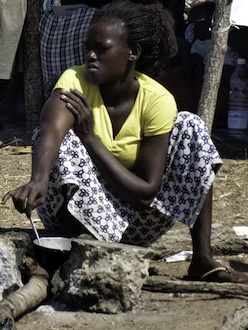 A displaced woman watches a plane taking off at the air strip in Ndélé, north of Central African Republic. Many people fled the town, seeking refuge at the air strip, after an attack by rebel troops on the 10th of December A displaced woman watches a plane taking off at the air strip in Ndélé, north of Central African Republic. Many people fled the town, seeking refuge at the air strip, after an attack by rebel troops on the 10th of December
|
The head of the African Union is traveling to the Central African Republic as tensions mount between the government and rebels there, an official said.Benin President Thomas Boni Yayi, who chairs the regional body, was scheduled to arrive in the Central African Republic Sunday and meet with the nation's president, said Margaret Vogt, a U.N. special representative.
The talks come amid lingering unrest in the inland African nation.
Rebels, angry with the government, have staged attacks in recent days. And the volatile situation has spurred demonstrations in Bangui, the country's capital and largest city.
Government authorities set an 8 p.m. (2 p.m. ET) curfew Sunday, said Josue Binoua, the minister of territorial administration and decentralization.
Rebels and government officials are scheduled to meet early this week for talks in Gabon, on Africa's western coast, Binoua said. He did not specify the date when the discussions would begin.
Amid fears of more violence, officials from various nations take steps to protect their citizens and interests in the Central African Republic,
U.S. President Barack Obama wrote a letter Saturday to Congress informing them that about 50 U.S. troops were sent to Chad on Thursday "to support the evacuation of U.S. embassy personnel and U.S. citizens from the Central African Republic."
Rebels were reported earlier last week to be about 190 miles from Bangui. But there's been a lull in rebel attacks in recent days.
Demonstrators in Bangui have urged foreign intervention to stop rebels from entering the city.
The unrest has prompted the United Nations to relocate dependents and nonessential staff from the country and the U.S. Embassy in Bangui to shut down operations. The U.S. State Department said Thursday -- the same day U.S. troops were sent to Chad -- its ambassador and diplomatic team left the capital, but that the United States is not cutting off diplomatic relations with the turbulent African nation.
President Francois Bozize on Thursday asked for other nations' help in staving off rebel advances that threaten his rule.
Bozize specifically called on France -- which ruled his country, then as a colony known as Ubangi-Shari, until it gained independence in 1960 -- and the United States to help ensure "the rebels return home ... instead of destroying and killing Central Africans."
France has a permanent presence of 200 to 300 military personnel at Bangui's airport under the mandate of the Economic Community of Central African States, and French President Francois Hollande ordered them to safeguard his nation's embassy earlier this week.
But Hollande said Thursday that his nation's troops are not there to "protect a regime," but instead protect French nationals and interests. France will not "interfere in the internal affairs of a country, in this case, CAR," Hollande said, adding, "That time is over."
CNN's Bharati Naik, Stephanie Halasz and Saskya Vandoorne contributed to this report.





















































































































































































































































































































































